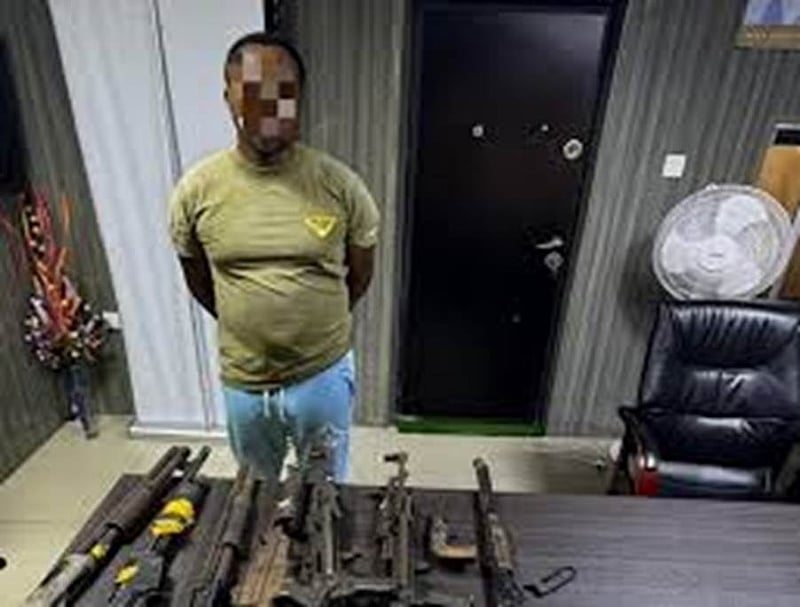Not long ago on a humid morning in Lagos, Nigeria, police spokesman CSP Benjamin Hundeyin addressed the press. The grim news he anxiously related to them was that a long-hunted criminal had finally been arrested. The suspect, arrested in connection with the poisoning and death of a 65 year-old man in Abule Egba, was revealed to be the same man who had been terrorising the Mushin area of Lagos State for years. But despite the gravity of the alleged crime, neither the Lagos State Police Command nor the media disclosed the name of the suspect. Instead, the name of this so-called ‘devil’ remained shrouded in secrecy, even after four grieving families had stepped forward to identify him as the man who murdered their children.
This unsettling silence by public officers raises several urgent questions. After so many years of terror and devastation, why are the police and media refusing to disclose this man’s name? Why does justice sometimes seem to wear a mask in Nigeria? More importantly, what could possibly be the consequences of withholding such critical information from a society that is already grappling with rising criminal activities and plummeting lack of public trust?
According to police reports, the suspect, whose name is yet to be officially confirmed, was arrested at the end of April 2025 after a meticulous police operation led by a team of homicide detectives. The man allegedly poisoned a bottle of malt drink and served it to an unsuspecting elderly man in a short-term rental apartment in Abule Egba. The victim died shortly afterward. A search of the premises and surrounding surveillance footage linked the incident to the suspect. And when he was questioned, the man reportedly confessed to the crime. More shockingly, he had been identified by four separate families from the Mushin area as the same individual who killed their children in previous unsolved attacks.
This string of revelations should have led to a public outcry and immediate public disclosure of his real identity. But instead, both police and media sources kept his identity hidden, citing various reasons that ranged from preserving the integrity of the investigation to protecting the suspect’s right to a fair trial.
The first proclamation often cited by police and legal authorities in virtually every serious case is the principle of ‘innocent until proven guilty.’ This fundamental right aims to protect suspects from premature judgment, especially in high-profile cases that could be easily influenced by media narratives. However, when a suspect confesses to a crime and is linked by multiple families to previous murders, the scale of public interest must outweigh the necessity for total secrecy. That is justice.
 The arrested suspect
The arrested suspect
Another justification is the protection of the ongoing investigation. Police often refrain from revealing key details, especially in cases that may involve more than one perpetrator. Disclosing a suspect’s identity too soon might alert accomplices, lead to the destruction of evidence, or even prompt retaliatory crimes. While this is a valid concern in active investigations, it must be weighed against the potential harm caused by keeping communities uninformed. While it is possible that the four families that identified the suspect could be at risk, in a country where witness intimidation is practically common, shielding these individuals until arrests are complete and trials are underway may indeed protect them. However, public awareness and institutional support for these families can offer them an even stronger form of protection.
Moreover, there are instances where Nigerian laws and media ethics guide non-disclosure of the source of information offered in confidence . For instance, if a case is under legal scrutiny, premature disclosure might be considered contempt of court. Journalistic ethics also caution against naming individuals when such disclosure could compromise legal processes or lead to vigilante justice. Despite these considerations, there are powerful arguments in favour of revealing the identities of such dangerous individuals.
When dangerous criminals roam freely or are newly arrested, communities have the right to know about their presence. Public disclosure ensures that others who may have been victims can come forward. It alerts neighbourhoods and allows citizens to take necessary precautions. Publishing the name and image of a suspect can always lead to new information from the public. Additional witnesses or victims may recognise the individual and provide further testimony, thereby strengthening the case and ensuring broader justice. Publicly identifying criminals holds law enforcement accountable. It also sends a strong signal to would-be offenders that the community and government will not tolerate such acts. The public naming of criminals becomes both a symbol of justice and a deterrent.
For victims’ families, seeing the accused named and shamed publicly can serve as a powerful form of closure. It validates their grief and acknowledges their suffering in the eyes of society. To deny them this is to deny their pain. Transparency is a cornerstone of public trust. When the public perceives that the government and media are hiding vital information, it erodes confidence in those institutions. Keeping the identity of such a notorious criminal under wraps can have severe consequences because clear, honest communication is essential for democratic governance and civic cooperation.
In the absence of official and authentic information, speculation and even superstition thrives. Rumours can damage innocent reputations, incite panic, and create division within communities. If citizens don’t know who to look out for, they cannot protect themselves. Failing to name the suspect could allow potential accomplices or similarly inclined individuals to go unnoticed. When the press censors itself or complies too easily with non-disclosure directives, it risks undermining its role as a watchdog. The media must, therefore, find a balance between responsible reporting and serving the public interest. When names are withheld indefinitely, the legal process may be slowed. Witnesses may lose interest, forget details, or move away. Public momentum is crucial in sustaining pressure on the justice system.
In many Western countries, suspects’ names are disclosed shortly after arrest, particularly when the crimes are of public interest. For example, in the United States and United Kingdom, police release names once formal charges are filed. Even in sensitive cases, anonymity is usually limited to minors or specific legal exceptions. Nigeria must evolve towards similar transparency, especially in cases involving serial crimes and public threats. What if there were a compromise?
Authorities could adopt a phased disclosure policy like initial anonymity to protect the investigation and families. They then opt for public disclosure after arraignment, once the suspect is formally charged or updates to inform the public without compromising legal integrity. This strategy balances privacy with public interest and ensures that the media plays its role without becoming a tool of mob justice. On another level, Nigeria’s legal system should provide clearer guidelines on when and how to disclose the identities of arrested individuals. Also, ethical disclosure training can help the police to navigate sensitive cases without sacrificing transparency. Government should invest in better protection for families and witnesses, in order to enable safe public trials. Community leaders, NGOs, and religious institutions should be part of the conversation on how to manage public information. More than all of this, government should introduce verified police alerts on social media platforms to quickly inform the public about threats without inflaming panic.
Naming and shaming the devil is not an act of vengeance. It is an act of justice. When the system fails to publicly identify criminals who wreak havoc on communities, it fails not just in process but in purpose. Transparency is not a luxury. It is a necessity, especially in a society where crime and mistrust are endemic. The Lagos Police and Nigerian media must not shy away from telling the truth, no matter how ugly. They owe it to the grieving families, to the people of Muslin, to the city of Lagos, and to the nation at large. At the end of the day, justice cannot be done in silence. It must be seen. It must be heard. And yes, it must be named.


